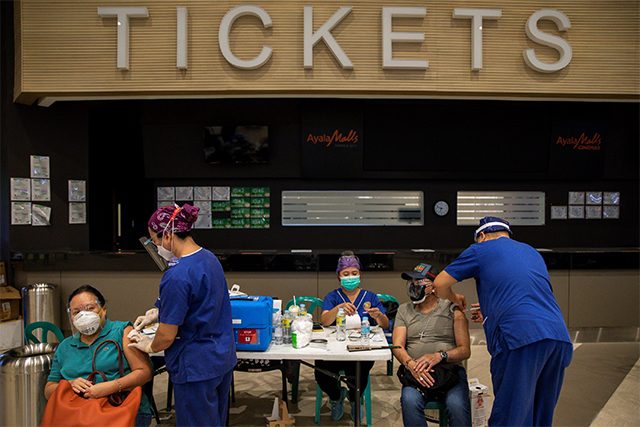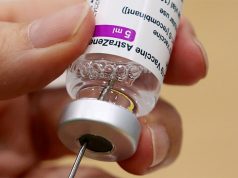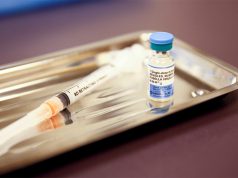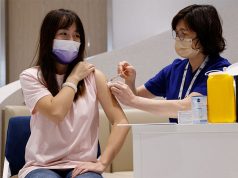
An infectious disease expert refuted the social media myth that “COVID-19 cases increase as vaccines start rolling out.”
Dr. Melvin Sanicas, also a Filipino vaccinologist based in Switzerland, juxtaposed a graphic of this claim with a quote card from the World Health Organization.
The quote card from World Health Organization Eastern Mediterranean office, meanwhile, reads: “Vaccines work, but they only with other preventive measures. Vaccines will not decrease the spread of the disease until most people are vaccinated.”
He also stressed that COVID-19 vaccines will only work once “community immunity” or herd immunity is reached.
Sanicas said a jab only provides additional protection to the inoculated person but does not shield the possibility of getting infected entirely.
“Do not expect vaccines to magically stop outbreaks. Vaccines are public health measures, they work best when the whole public participates,” Sanicas said.
“Vaccines work to protect the individual only until a big portion of the population has been vaccinated (community #immunity reached),” he also said.
#VaccinesWork to protect the individual only until a big portion of the population has been vaccinated (community #immunity reached). DO NOT expect vaccines to magically stop #outbreaks. Vaccines are #publichealth measures, they work best when the whole public participates. pic.twitter.com/I5f5kaGPlo
— Dr. Melvin Sanicas 🩺🔬 (@Vaccinologist) May 18, 2021
Another doctor also said that fully vaccinated Filipinos should still wear face masks, but not face shields, citing the hot weather in the country.
“I wear an N95 or a KF 94 mask all the time even if I’m fully vaccinated, but can we please stop wearing face shields in public, Philippines? It’s 40°C outside,” the doctor wrote.
COVID-19 jabs as protection instead of a panacea is what international health organizations have been telling the public since the start of vaccine rollout in the world.
In a briefer, the United States Centers for Disease Control and Prevention stated that a COVID-19 vaccine only offers protection, not cure.
“Getting COVID-19 may offer some protection, known as natural immunity. Current evidence suggests that reinfection with the virus that causes COVID-19 is uncommon in the months after initial infection, but may increase with time,” it said.
“The risk of severe illness and death from COVID-19 far outweighs any benefits of natural immunity. COVID-19 vaccination will help protect you by creating an antibody (immune system) response without having to experience sickness,” it added.
In a separate tweet, Sanicas also shared an infographic showing that all available vaccine brands in the country are effective in boosting the human body’s immune system.
Sinovac’s #Coronavac & #Oxford #AstraZeneca‘s #CoviShield #Vaxzevria #CovidVaccines have both been found to boost #antibody responses in almost all #vaccine recipients. @BangkokPostNews @ChulalongkornU #VaccinesWork #VaccinesSaveLives pic.twitter.com/OmzFLFNHHx
— Dr. Melvin Sanicas 🩺🔬 (@Vaccinologist) May 19, 2021
Meanwhile, according to WHO, herd immunity is “the indirect protection from an infectious disease that happens when a population is immune either through vaccination or immunity developed through previous infection.”
To achieve community or herd immunity, a substantial number of a country’s population should have been fully inoculated.
The exact percentage of the population needed for herd immunity is still unknown. The John Hopkins Bloomberg School of Public Health stated that it is normally from 50% to 90% of the population.
“The higher the level of immunity, the larger the benefit. This is why it is important to get as many people as possible vaccinated,” the organization said.
The Food and Drug Administration has so far approved seven COVID-19 vaccines for emergency authorization use.
These are the following:
- Pfizer-BioNTech COVID-19 Vaccine (BNT162b2)
- ChAdOx1-S[recombinant] (COVID-19 Vaccine AstraZeneca)
- SARS-CoV-2 Vaccine (Vero Cell), Inactivated [Coronavac]
- Sputnik V Gam-COVID-Vac COVID-19 Vaccine
- Janssen COVID-19 Vaccine (Ad26.COV2-S (recombinant))
- Whole Virion, Inactivated Corona Virus Vaccine [Covaxin]
- COVID-19 mRNA Vaccine (nucleoside modified) [COVID-19 Vaccine Moderna]









